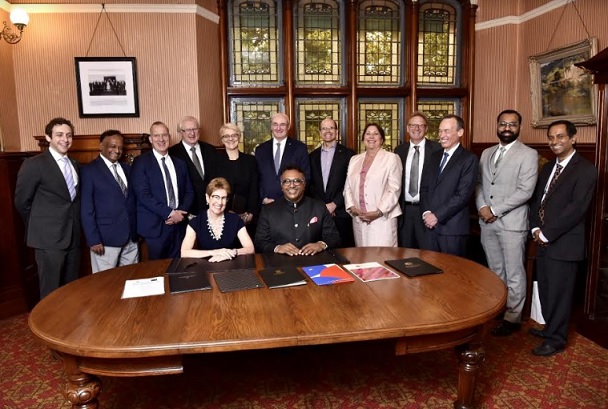Sydney | New Delhi, India | 6th December 2019: O.P. Jindal Global University (JGU), one of India’s Institutions of Eminence, signed Seven MOUs with leading universities in Australia.

Her Excellency, Hon. Margaret Beazley, the Governor of New South Wales, hosted a delegation from JGU led by Founding Vice Chancellor, Professor (Dr.) C. Raj Kumar at Government House. The Governor of New South Wales presided over the signing of MOUs with the following leading Australian universities, all of which have been ranked as top 3% of the universities in the world: Macquarie University, University of New South Wales, University of New England, University of Newcastle, University of Sydney, University of Technology Sydney, Western Sydney University. It is notable that two of these universities are among the top 50 in the world.
The Honourable Margaret Beazley AO QC, Governor of NSW said, “As Governor of New South Wales, I am honoured to host the signing of the MOUs between a number of New South Wales universities and O.P Jindal Global University at Government House. These partnerships will benefit Indian and New South Wales students and faculty members, who will gain opportunities to deepen their educational and cultural connections, while also promoting important links that will foster academic excellence in our two nations. Dennis and I have been involved with the growth and development of O.P. Jindal Global University in our roles as Adjunct Professors. It is exciting to see the plans for greater collaboration between O.P. Jindal Global University and New South Wales universities come to fruition.”
At this interesting time in global diplomacy, international trade and international flow of knowledge, JGU entering into strategic partnerships with leading Australian universities will catalyse cutting edge research, knowledge sharing among faculty and will boost international student mobility. More specifically, the partnerships will promote faculty and student exchanges, dual degree programmes, joint teaching, joint research, joint conferences and joint publications, besides pathways into the Ph.D. programmes in the Australian universities.
JGU, with its academic programmes in law, business, international affairs, public policy, liberal arts & humanities, journalism, architecture and banking & finance, will inspire academicians aspiring to bring about a positive change in the current world order. “This is a historic moment for JGU. We have signed agreements with some of the world class universities in Australia, which will provide unique opportunities for the faculty and students of JGU. Our commitment to strengthening Australia-India relationship goes beyond higher education partnerships. India and Australia share values of democracy, pluralism and the rule of law. As the youngest university to break into the QS World University Rankings, the signing of these agreements reflect JGU’s commitment to promote internationalisation and meaningful partnerships with the leading Australian universities,” says, JGU’s Founding Vice Chancellor, Professor (Dr.) C. Raj Kumar.
A delegation led by Professor C. Raj Kumar visited Australia this week as a part of JGU’s larger vision to establish strong international collaborations with global universities. The Australian visit coincides with JGU’s tenth anniversary and a commitment since its founding to developing strong Australia-India linkages. Professor Kumar said collaboration in higher education not only strengthens institutional ties, but also bridges the gap between Australia and India. “These collaborations will create stronger people-to-people linkages and research collaborations between students and faculty in India and Australia. India’s demographic dividend has created new opportunities for higher education to become the strongest pillar of the partnership between both the countries,” he said.
JGU is also home to the Centre for India Australia Studies (CIAS), the first and only centre embedded in an Indian higher education institution that is focused on the India-Australia bilateral relationship. CIAS is led by Australian Academic, Professor Shaun Star, Associate Professor & Associate Dean of Jindal Global Law School at JGU. JGU has MOUs with 20 Australian universities as well as a leading law firm Corrs Chambers Westgarth and the Commonwealth Attorney General’s Department.
“The partnership between the top universities in Australia and India augurs well for the growing bilateral relationship between the two countries. The Centre for India-Australia Studies (CIAS) housed in an Indian university, aims to inspire the next generation of Australian and Indian students to learn about and embrace the opportunities in each country and to contribute to the enduring partnership between the two nations. CIAS is working towards developing an Australian imagination in India and an Indian intellectual presence in Australia,” CIAS Director, Prof. Shaun Star said.
As part of the vision of the CIAS, JGU will be hosting more than 100 Australian students in India in 2020, for various India Immersion Programmes. To date, JGU has hosted nearly 300 distinguished Australians for lectures, conferences and workshops, providing students and faculty the opportunity to interact with the best and brightest in Australia. “Australia’s robust universities can build partnerships with some of the globally ranked Indian universities to promote intellectual engagement and internationalisation. This can only be a good thing for both nations,” Prof. Shaun Stars said.
During the visit to Sydney, Professor C. Raj Kumar presented a distinguished keynote lecture on “The Rule of Law and Democracy in India” at the Government House, hosted by the Governor of New South Wales. The function was attended by members of the JGU delegation, Vice Chancellors from various partner universities, academics, members of the Judiciary, senior Barristers and lawyers from Australia.





